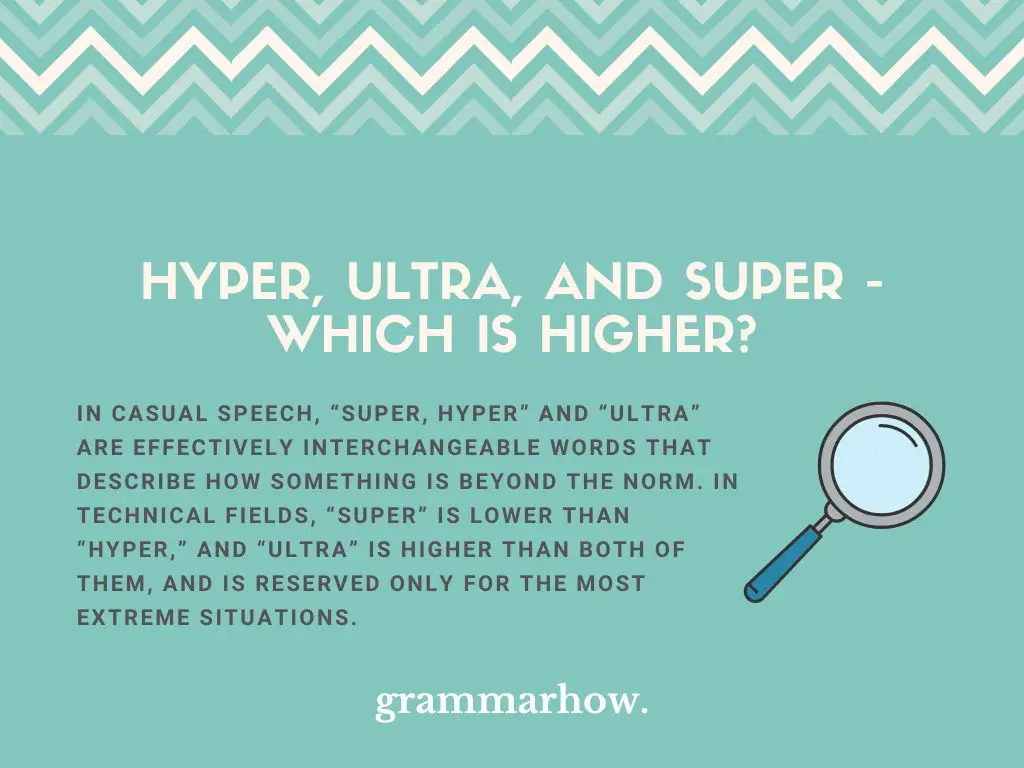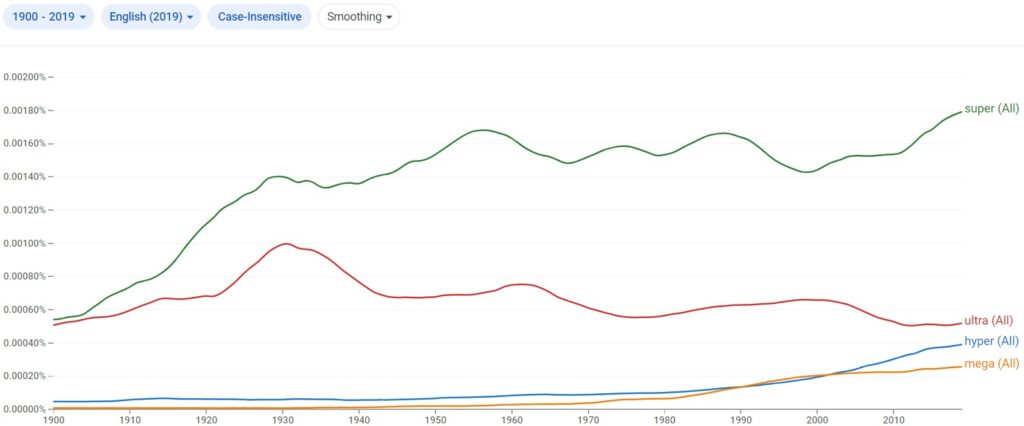The English language has a lot of adjectives that are very similar, with them seemingly being interchangeable most of the time. But is there actually a difference between hyper, ultra, and super? Which of these is higher than the others, the “large” to the “larger?”
In this article, we’ll talk about all three of these adjectives and how they relate to one another.
Hyper, Ultra, and Super – Which Is Higher?
In casual speech, “super, hyper” and “ultra” are effectively interchangeable words that describe how something is beyond the norm. In technical fields, “super” is lower than “hyper,” and “ultra” is higher than both of them, and is reserved only for the most extreme situations.

This answer may not be as cut and dry as you are looking for, but unfortunately, that’s just the way it is. When it comes to adjectives, some words do not have some objective scale by which they can be measured relative to each other. There is no official consensus on “hyper” being above “super.”
Or at least, not as far as everyday speech is concerned. In casual conversation, there is no objective way to say that “hyper cool” is cooler than “super cool.” That’s a matter of personal perspective. However, in certain fields, there is an objective scale. A good example is aircraft and speed.
When an aircraft flies faster than the speed of sound, it is said to be supersonic. But if its speed is far beyond normal supersonic speeds, it is said to be hypersonic. In this case, “hyper” is clearly above “super.” This remains true in many areas of engineering and technology.
Then we have “ultra,” which is a bit of an outlier. But instead of breaking it down here, why don’t we give each word some time to shine?
Super
According to the Cambridge Dictionary, super means “especially; very.”
So in casual terms, it’s just a way to say that something is beyond the norm. It’s an adverb that can be used to elevate any adjective to something more significant. If “tasty” isn’t good enough, you can say “super tasty.”
Of course, if you are using it in technical settings, such as engineering or aerodynamics, “super” may have a more specific definition, so don’t just throw it out willy-nilly in such environments.
Here are some examples of how “super” could be used in everyday conversation:
- That movie was super awesome; the best I’ve ever seen!
- This dessert isn’t just good, it’s super good!
Hyper
The Cambridge Dictionary defines “hyper” as “greater or much more than usual.”
In casual contexts, it can be used almost interchangeably with “super” and no one will really have an issue with it. In technical contexts, such as scientific fields “hyper” is generally considered above “super” in scale.
However, if your only concern is casual conversation and regular use, you can use “hyper” just as you would “super.” However, it should be noted that unlike “super” the word “hyper is almost always attached to an existing word like a prefix. Instead of “super expensive” it would be “hyper-expensive.”
Here are some examples of how to use “hyper” in a sentence:
- Joey seems extremely hyperactive today.
- Janet is hyper-fixated on her surroundings for some reason.
Ultra
The Cambridge Dictionary defines “ultra” as “extreme or extremely.”
Ultra is generally considered to be reserved for levels even beyond that of “super” or “hyper.” You should use it primarily as a synonym for “extreme,” another word used to denote the highest level of something in most cases.
In casual conversation, you can reserve “ultra” for situations where you feel that even “super” or “hyper” aren’t fitting enough.
Here are some examples:
- The idea of salted chocolate is ultra appealing to me!
- My mother is ultra ferocious when we get on her nerves.
Mega
The Cambridge Dictionary defines “mega” as “large in amount or size.”
This means it’s not really an exact synonym for “super, hyper, or ultra.” Those refer more to the “level” of something, while “mega” refers more to actual size or scope. Still, “mega” can be used the same way in most cases.
Here are some examples of how to use “mega” in a sentence:
- A millionaire is rich, but a billionaire is mega rich.
- After extra-large, the next size of burger at this restaurant is called a mega burger.
What Is the Super Ultra Mega Meta Lydian?
If you’ve heard of this particularly strange phrase, you might be wondering how it ties into all of this: well, it doesn’t, really. The Super Ultra Mega Meta Lydian has nothing to do with language, it’s actually related to music.
It’s a bit too complicated to get into in full, so the short version is this: it’s a repeating pentachord that has four repeating intervals. If you want to know more about this, you’ll have to conduct some research of your own!
Which Is Used the Most?
This graph from Google’s Ngram Viewer reveals that “super” is used more frequently than any of the other words. Next is “ultra,” then “hyper,” and finally “mega.”

However, none of these words are particularly outdated, and they could all be considered fairly common in modern speech.
Final Thoughts
Hyper and super are often adjectives that are used interchangeably, though depending on the field of discussion, hyper can sometimes be above super. However, it is generally assumed that “ultra” is higher than either of these two, though that too comes down to individual perception of these words.

Martin holds a Master’s degree in Finance and International Business. He has six years of experience in professional communication with clients, executives, and colleagues. Furthermore, he has teaching experience from Aarhus University. Martin has been featured as an expert in communication and teaching on Forbes and Shopify. Read more about Martin here.
